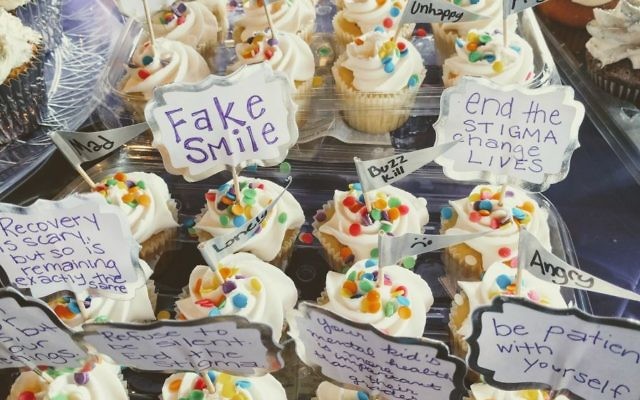Baken Makes Room for Mental Health in Nest
Community members gather to discuss depression and resources available for treatment.
The last thing you might expect to see at a synagogue on a Sunday morning is a rabbi carrying an embroidered New Orleans Mardi Gras mask, especially when it’s not close to Purim.
But Rabbi Analia Bortz of Congregation Or Hadash, where the mental health initiative Baken (In the Nest) launched Sunday, Aug. 13, pulled no punches when she took the bimah before the opening sessions of Baken’s first program. As co-founder with Devi Knapp, who told her story earlier that morning, the doctor and rabbi kept a hold on the room, showing the value of the mental health collective for the community.
“Mental illness is the cancer of the soul,” Rabbi Bortz said, each word crisp and clear. She talked about people every day getting ready for job interviews who might put on masks like the one she held. People with depression, anxiety and other mental illnesses never take off their masks. They are stiff as a Mardi Gras mask, wooden and painful.
“Mental illness is an illness,” she said. “We must treat it like diabetes. Be honest. Embrace. And we can fight the stigma together, and we can get to mental wellness.”
She emphasized the stigma surrounding mental illness.
For example, this year’s movie “Split,” from writer-director M. Night Shyamalan, faced criticism because many in the mental health community worried that it reinforced the popular equation between “crazy” and “violent.” The main character, a kidnapper played by James McAvoy, is diagnosed with dissociative identity disorder.
If someone with diabetes isn’t feeling good, as Rabbi Bortz indicated, friends suggest seeing a doctor, checking or changing medication, or getting other medical help.
With mental illness, the attitude is different. People suggest going outside more, exercising or drinking more water. They might say, “I’ve had days like that” or “Have you tried not thinking about it?”
Such irritating comments, which serve only to invalidate the pain that people feel at the lowest points of their lives, can come any day from anyone. They make people who are ill think they are exaggerating about their own problems; as a result, those problems grow and grow.
Open discussion, positive reinforcement and education can rein in those problems.
“Mental illness is an illness. We must treat it like diabetes. Be honest. Embrace. And we can fight the stigma together, and we can get to mental wellness.”
Knapp has been open about her mental health, and she said that willingness to speak out has led many others to act, to talk about their own stories and ask to talk to her in private.
People want and need to talk about mental health, and her speech at Or Hadash inspired more people to ask for time with her, either to donate to Baken or to speak about their own experiences.
“When I talk about it, it makes people think about their own stories,” Knapp said.
Because of her experience, she knows that people need a place to talk, an open space with support.
Baken (www.baken-atlanta.org) has been in the works for a long time, and the result of that planning was a strong launch with more doctors ready to help and more people participating than the co-founders expected.
The goals of Baken are clear: to educate the community about mental health, create an open environment of support for friends and family, and help those who need that nest.
The event was filled with respect and open-hearted conversation. The topics of discussion included eating disorders, sleep management, suicide and how to take care of yourself when you’re the token caretaker.
Baken’s next program, “The Art of Mindfulness Therapy,” is scheduled for Sunday, Sept. 10, at Or Hadash. RSVP to info@baken-atlanta.org.




comments